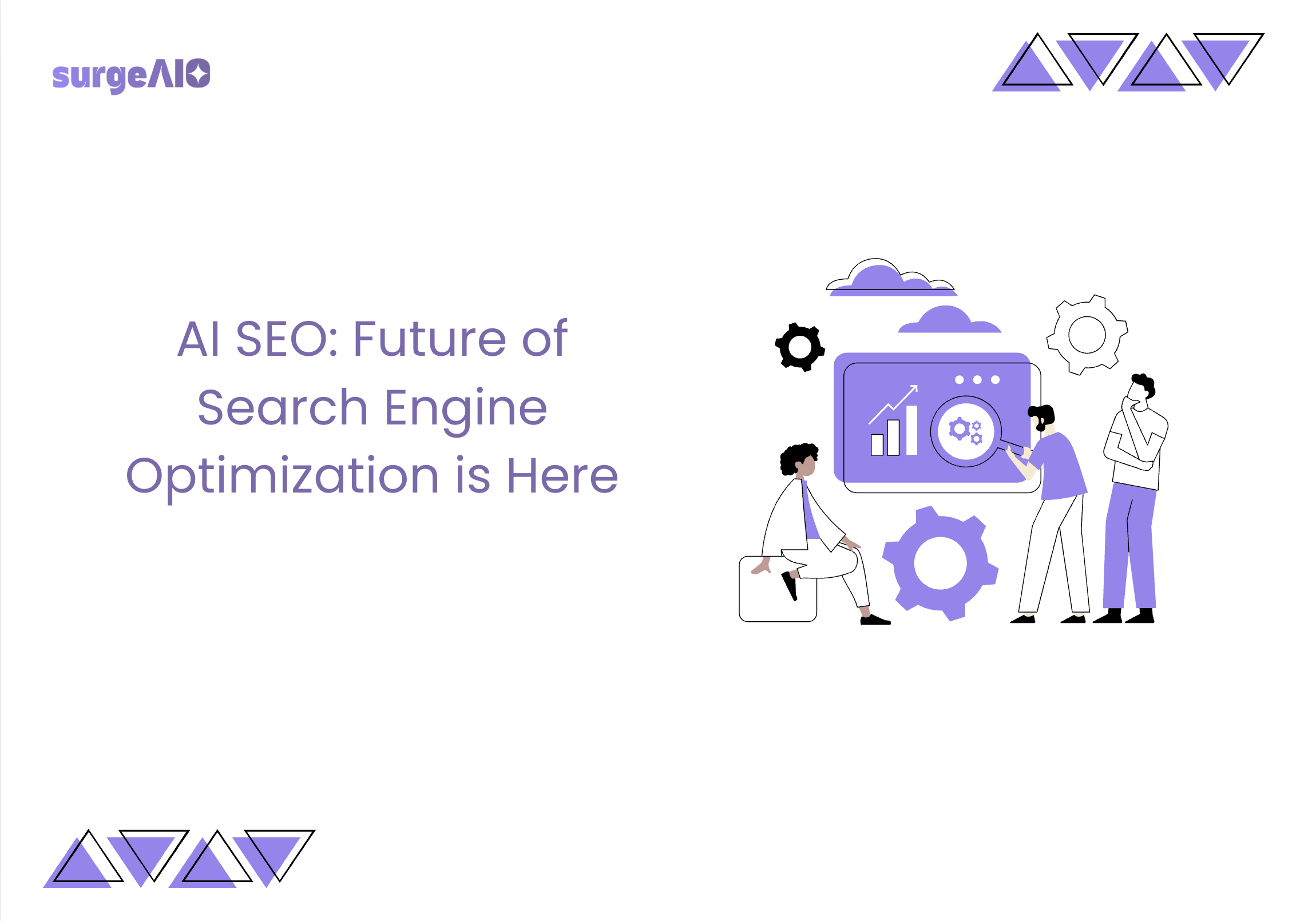Search engine optimization (SEO) has always been a moving target. What worked yesterday may not work today and what will work tomorrow is already evolving. In 2024 and beyond, AI SEO is no longer a buzzword it’s the cornerstone of competitive digital strategy.
If your brand isn’t leveraging AI to understand search intent, automate optimizations, and track visibility across both search engines and AI platforms (like ChatGPT or Perplexity), you’re leaving massive organic growth on the table.
This blog dives deep into what AI SEO really is, how it’s different from traditional SEO, and how to use it to grow traffic, conversions, and brand visibility.
What is AI SEO?
AI SEO is the application of artificial intelligence technologies to improve your website’s ranking, visibility, and performance on search engines and emerging AI powered platforms. It combines:
- Machine learning algorithms
- Natural language processing (NLP)
- Predictive analytics
- Automation tools
to make data driven SEO decisions faster and more effectively than traditional methods.
But AI SEO is more than just using tools. It’s about shifting your approach from static, rule based optimization to dynamic, intent focused strategies that adapt in real time.
Why Traditional SEO is No Longer Enough?
Until recently, SEO was largely about:
- Targeting keywords with high search volume
- Optimizing meta tags and headings
- Earning backlinks from other websites
- Publishing blog posts regularly
These tactics still matter but they don’t work in isolation anymore.
Why?
Because search engines and search behavior have changed.
- Google now uses machine learning (like BERT and RankBrain) to understand user intent.
- Generative AI (e.g., ChatGPT, Gemini, Claude) is answering queries directly often without sending traffic to the source site.
- AI Overviews (on Google) and AI assistants (like Perplexity) are choosing which sites to show, based on visibility, relevance, and semantic depth not just keywords.
In short: ranking on page 1 of Google is not enough anymore.
You need to rank on AI Overviews, ChatGPT, Perplexity, Bing Copilot, and more.
Core Components of AI SEO:
1. AI Powered Keyword and Topic Research
Traditional keyword tools focus on search volume and competition. AI SEO tools go a step further.
They analyze:
- Semantic relationships between queries
- User intent behind each search
- Trending topics before they spike
- Entity level optimization (People, Places, Brands, Concepts)
For example, tools like SurferSEO, MarketMuse, Frase, and SurgeAIO use machine learning to suggest not just keywords, but the topical clusters you need to cover to become an authority in your niche.
2. Search + AI Assistant Visibility Tracking
This is where most people fall short. It’s not just about Google anymore.
A good AI SEO strategy tracks:
- Where your site appears in Google AI Overviews
- Which of your content is being pulled into ChatGPT responses
- How your brand shows up on Perplexity, Bing Copilot, and Claude
- Which URLs are gaining traction over time across AI interfaces
Visibility score is the new metric.
Instead of just checking your Google rank for “best CRM for startups,” you’ll now want to know:
- Is your site referenced by ChatGPT when users ask that?
- Which pages are most quoted by Perplexity?
- Are you showing up when people ask AI tools for recommendations in your category?
3. Content Optimization with NLP
AI SEO tools can now analyze your content using Natural Language Processing, just like Google does.
That means they can:
- Compare your article to the semantic structure of top ranking pages
- Suggest improvements in tone, reading level, and depth
- Recommend missing topics and questions
- Identify internal linking opportunities
Tools like Clearscope, Surfer, Jasper, and Koala can help here but the real value comes from combining these insights with human storytelling.
AI gives you the structure. Your brand gives it voice.
4. AI Generated & Human Edited Content
Let’s be honest: everyone’s generating content with AI.
But Google (and users) are smarter than that.
Pure AI content ≠ rankable content.
You need AI assisted content, not AI only.
Here’s a proven workflow:
- Use AI to generate a first draft using tools like ChatGPT, Claude, or Koala.
- Human edit the output to improve:
- Originality
- Examples
- Brand tone
- Thought leadership
- Originality
- Run it through AI SEO tools to ensure you’re covering all the important angles semantically.
The result? Fast, high quality content that ranks and converts.
5. Automation + Real Time Adaptation
AI SEO isn’t just about research and content. It’s about scalability and adaptability.
With the right stack, you can:
- Automate internal linking based on topic clusters
- Detect and fix thin content or outdated pages
- Redirect decaying content to updated URLs
- Monitor changes in AI Overviews or ChatGPT visibility
This is what separates smart SEO teams from outdated ones.
Instead of quarterly audits, AI SEO enables continuous optimization.
AI SEO vs Traditional SEO: A Quick Comparison
| Feature | Traditional SEO | AI SEO |
|---|---|---|
| Keyword Targeting | Based on volume | Based on intent & semantics |
| Search Engines | Google & Bing | Google + ChatGPT + Perplexity + Bing Copilot |
| Content Creation | Manual | AI assisted + Human edited |
| Ranking Signals | Links, keywords | Entity relevance, content depth, visibility |
| Reporting | Google Search Console | Multiplatform visibility (AI + search) |
| Speed | Manual updates | Real time monitoring & optimization |
How to Implement AI SEO: Step by Step
Here’s a simplified roadmap to get started:
Step 1: Audit Your Current Visibility
- Use tools like SurgeAIO to check where your site appears across search engines and AI tools.
- Identify which pages are already ranking and which are invisible.
Step 2: Identify High Intent Topics
- Use AI powered research to find topic clusters your audience is searching for.
- Don’t just chase keywords look for conversational queries AI tools will answer.
Step 3: Create Authority Driven Content
- Use AI to generate outlines and ideas
- Add real world examples, unique insights, and brand voice
- Optimize semantically using NLP suggestions
Step 4: Track AI + Search Rankings Together
- Install trackers that monitor visibility on:
- Google AI Overviews
- ChatGPT results
- Perplexity citations
- Google AI Overviews
- Monitor changes weekly, not monthly.
Step 5: Iterate Fast
- Use AI suggestions to update old content
- Fill topical gaps
- Add schema, links, and multimedia
- Scale without sacrificing quality
Common Misconceptions About AI SEO
❌ “AI generated content is spammy.”
Not if it’s edited and enriched with human expertise.
❌ “Google punishes AI written content.”
False. Google ranks helpful content regardless of how it was created.
❌ “You can just publish and pray.”
AI SEO requires constant iteration, monitoring, and optimization.
Best AI SEO Tools in 2025
Here’s a shortlist of tools making AI SEO work in the real world:
- SurgeAIO – Tracks search + AI visibility, monitors rankings across ChatGPT, Perplexity, Google AI Overviews.
- Frase – Helps build content briefs and optimize semantic coverage.
- SurferSEO – Offers real time content scoring + NLP suggestions.
- Koala – One click AI content generation with built in SEO logic.
- Jasper – Brand aware long form content generator.
- MarketMuse – Deep topical authority planner with predictive content scoring.
Future Trends in AI SEO
- Personalized search results based on user profiles (AI assistants are learning your preferences).
- Voice first SEO as AI voice agents become more common.
- AI driven backlink discovery based on citation patterns in large language models.
- Searchless discovery – content that ranks without being searched (e.g., showing up in AI conversations directly).
Conclusion: AI SEO is the New Competitive Edge
If SEO is a game, then AI just changed the rules.
You’re no longer just optimizing for Google you’re optimizing for machines that talk, think, and recommend.
That means you need:
- Smarter research
- Faster content workflows
- Wider visibility tracking
- And a mindset that’s always testing, always learning.
Whether you’re a solo creator, agency, or enterprise now is the time to build your AI SEO stack, track your true visibility, and grow with intent.
Need help implementing AI SEO?
Whether you’re just starting out or want to track your brand’s presence across ChatGPT, Google, and Perplexity we can help. Let’s build your AI visibility stack together.
Frequently Asked Questions:
What is AI SEO?
AI SEO refers to the use of artificial intelligence technologies such as machine learning, natural language processing (NLP), and predictive analytics to improve website visibility, ranking, and performance on search engines and AI platforms (like ChatGPT, Perplexity, and Bing Copilot). It automates tasks, analyzes user intent, and optimizes content at scale.
How is AI SEO different from traditional SEO?
Traditional SEO relies on manual keyword targeting, backlink building, and static audits. AI SEO, on the other hand:
Understands intent using NLP
Automates research and optimization
Tracks rankings on AI tools (ChatGPT, Gemini, etc.)
Offers continuous insights and real time updates
It’s smarter, faster, and built for a multi platform future.
Can I rank on ChatGPT or Perplexity like I do on Google?
Not exactly you don’t “rank” in the same way.
But you can optimize your content to be cited or referenced by ChatGPT, Perplexity, Claude, or Bing. This involves:
Covering topics comprehensively
Including clear, factual data
Using structured content (like Q&A, lists, headings)
Tracking visibility with the right tools
Is AI generated content safe to use for SEO?
Yes, as long as it’s human edited and adds value.
Google’s guidelines focus on helpful, original, and people first content regardless of how it’s created. That said, avoid:
Copy paste AI articles without editing
Low quality, duplicate outputs
Content without unique insights or examples
Best practice: Use AI for drafting → Human for polishing
What tools should I use for AI SEO?
Some of the most effective AI SEO tools include:
SurgeAIO – Tracks visibility across search + AI tools
Frase / Jasper / Koala – For AI assisted content creation
SurferSEO / MarketMuse – For content optimization
Clearscope – For NLP based scoring
Choose your stack based on content volume, team size, and your need to track AI visibility.
How do I know if my content is showing up in AI Overviews or ChatGPT?
You can use tools like SurgeAIO that track:
Which of your URLs are being cited in ChatGPT
Whether your brand appears in Perplexity answers
Google AI Overview snapshots and triggers
Manual methods include:
Searching your brand or keywords in AI tools
Asking ChatGPT or Perplexity questions your audience would
But tracking manually is time consuming use automation.

Aditya Kumar B. is your go to lifestyle curator sharing daily entertainment rich tips and tricks for streamlined, joyful living. Avidly exploring the worlds of streaming and leisure, Adi blends chill vibes with thoughtful recommendations, helping audiences stay on top of trending shows, streaming hacks, and laid back self care routines. Whether you’re searching for your next binge worthy series, the perfect TV setup, or clever ways to unwind, Aditya has your back making every moment feel relaxed and effortlessly enjoyable.


